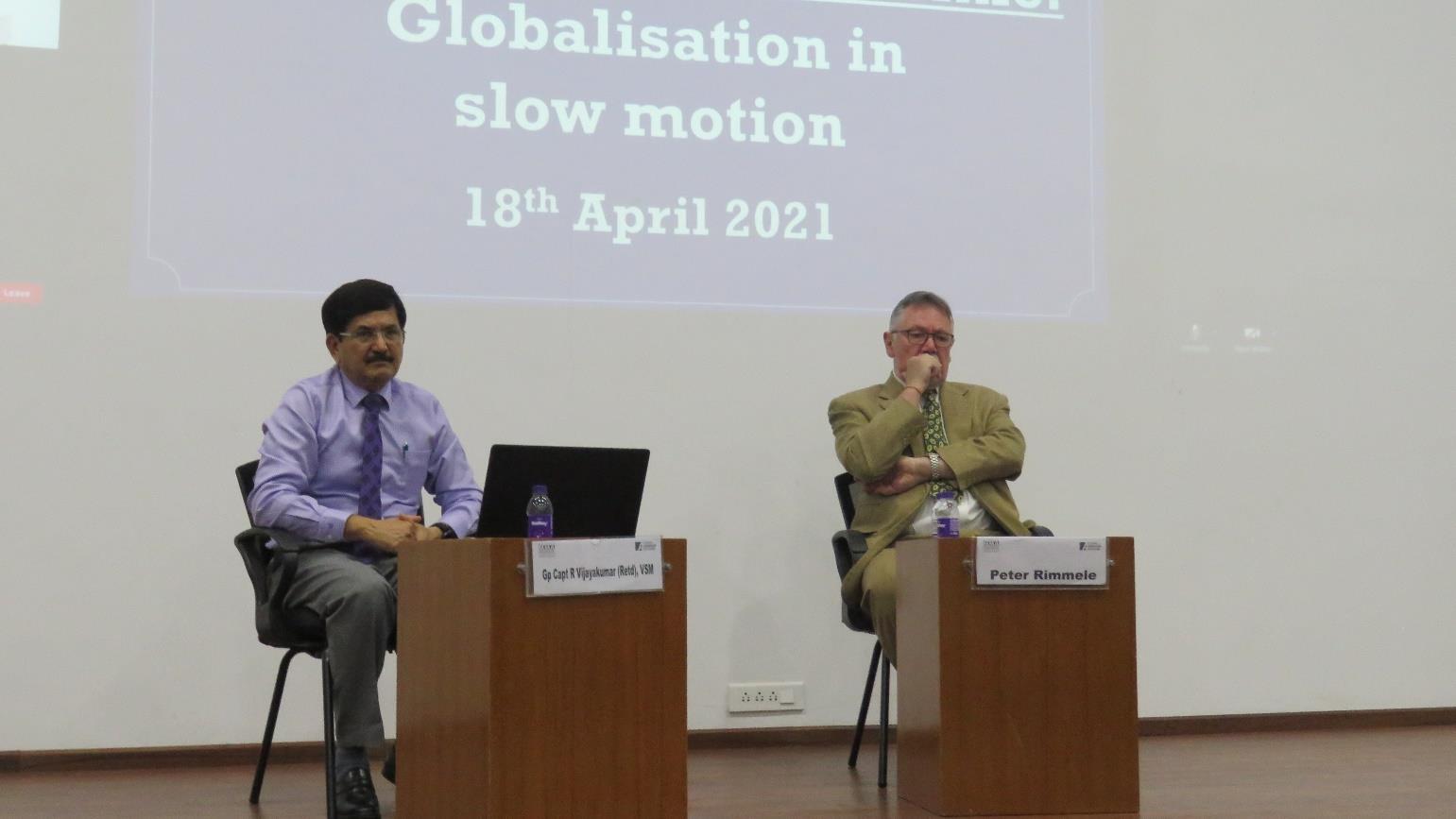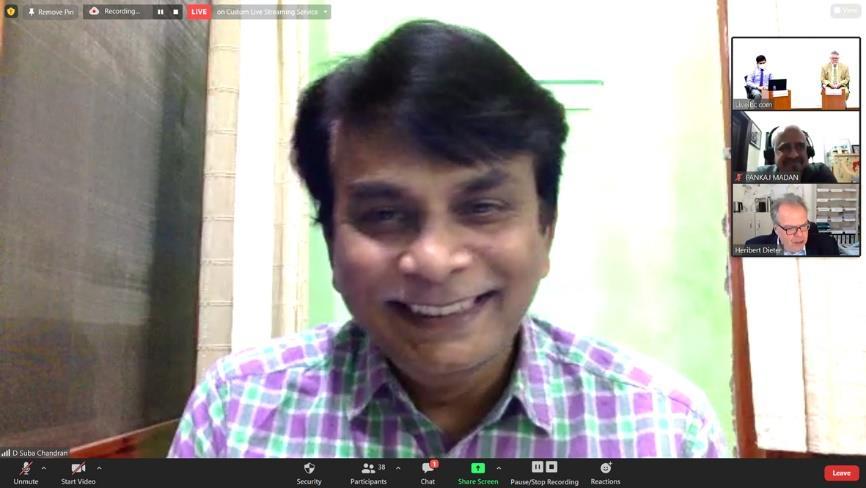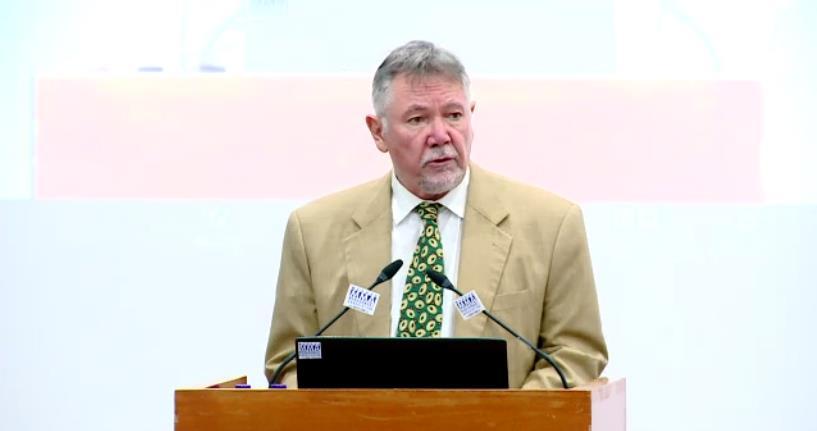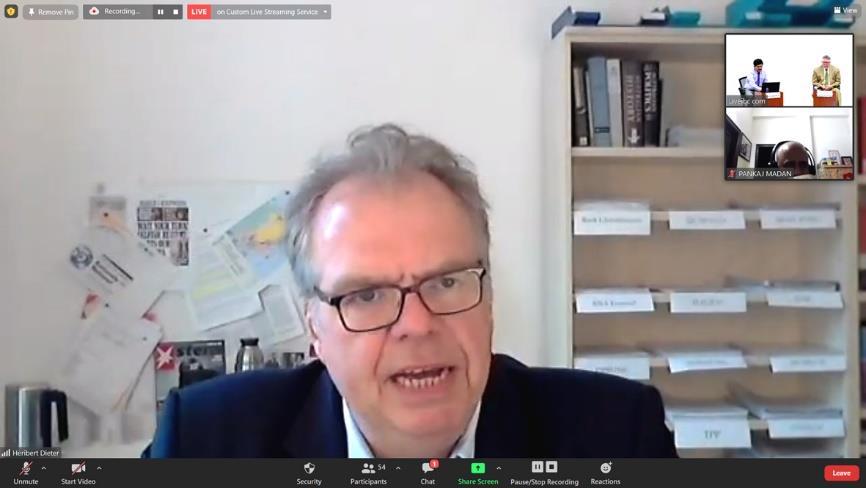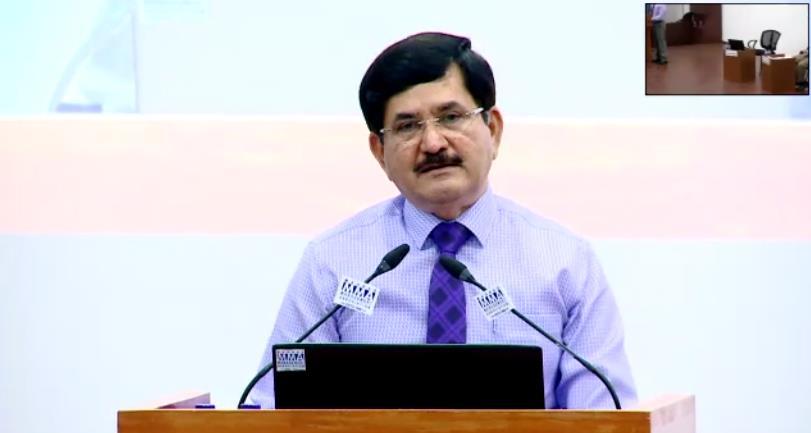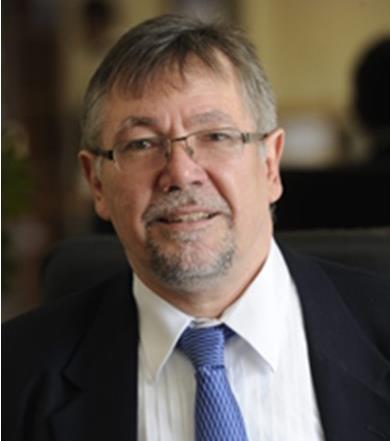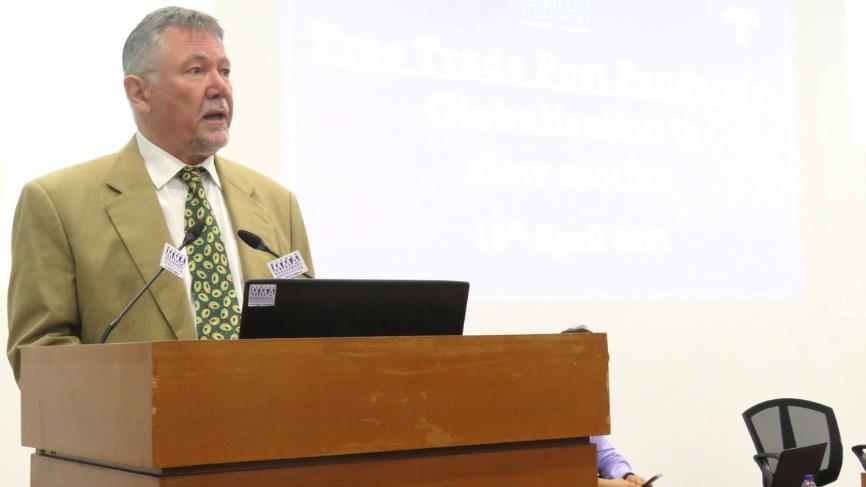Report on the Hybrid Event: “Free Trade Post-Pandemic:
Globalisation in slow motion”
FOUNTAINHEAD OF EXCELLENCE Event on Zoom/MMA Facebook/ Live Streaming/YouTube Page 1 of 28
Exclusive Event for Students On the theme
Free Trade Post-Pandemic:
Globalisation in slow motion Speakers: Mr. Peter Rimmele Resident Representative to India Konrad-Adenauer-Stiftung
Prof. Dr. Heribert Dieter Senior Fellow, Research Unit, Global Issues German Institute for International and Security Affairs, Berlin
Dr. D. Suba Chandran, PhD Professor & Dean, School of Conflict and Security Studies Head, Conflict Resolution and Peace Research Programme & Science Diplomacy Programme National Institute of Advanced Studies (NIAS) Indian Institute of Science Campus
Held on Sunday, 18 April 2021 6.00 pm – 7.30 pm
Page 2 of 28
Free Trade Post-Pandemic: Globalisation in slow motion Sunday, 18 April 2021 S No
TABLE OF CONTENTS Details
Page No
1
Invitation
4
2
The Context
5
3
Programme Overview
6
4
Profile of the Speakers
7
5
Key Statements
10
6
Key Takeaways
11
7
Welcome Address
15
8
Introductory Remarks
16
9
Special Address by Prof Dr Heribert Dieter
17
10
Q&A
19
11
Concluding Remarks & Vote of Thanks
22
12
Photos
23
13
Links for Recordings
25
14
About the Partners
26
Page 3 of 28
Page 4 of 28
The Context
The threat perception of Covid-19 pandemic on our society and economy mitigated considerably, if not eradicated entirely, with a sharp decline of cases from the first wave. However, the resurgence of a second wave in India and other parts of the world has raised more questions than answers. Discovery of vaccines to tackle the pandemic is the silver lining among the dark clouds to get across to a post-pandemic world. The entire post-pandemic economic discourse hinges as much on the pre-Covid situation as on the latter. Hence, there is a need to temper optimism with pragmatism, acknowledge the opportunities and challenges, and also identify actionable initiatives, where the government and the industry have to work together. Even prior to the pandemic, globalisation as a concept was getting into trouble in the context of glaring inequities in economic growth, economic slowdown, US-China trade disputes and other issues. The pandemic has further resulted in more questions on the future of free trade and globalisation. Will globalisation be accelerated or will it move in a slow motion? MMA-KAS-NIAS organised a discussion exclusively for the benefit of student community on the subject on 18 April 2021. This is the second programme in a row on the theme of “Free Trade-Post Pandemic. The first programme was held on the theme, “Free Trade-Post Pandemic: Rationale vs. National” on 17 April 2021 as a national conclave.
***
Page 5 of 28
Programme Overview Madras Management Association (MMA) in collaboration with Konrad-AdenauerStiftung (KAS) and National Institute of Advance Studies (NIAS) conducted a hybrid event on the theme, “Free Trade Post-Pandemic: Globalisation in Slow Motion” on
Sunday, 18 April 2021 at MMA Management Centre, Chennai. Considering the pandemic restrictions, the programme was held as a hybrid event with some of the panelists joining in-person in the venue and the rest of the speakers joining the discussions virtually. The speakers for the event were:
Mr. Peter Rimmele, Resident Representative to India of KAS
Prof. Dr. Heribert Dieter, Senior Fellow, Research Unit, Global Issues, German Institute for International and Security Affairs, Berlin (joined online from Berlin)
Group Captain R. Venkatraman (Retd), GM, MMA anchored the proceedings as Master of Ceremony. Group Captain R. Vijayakumar (Retd) VSM, Executive Director, MMA welcomed the speakers and participants and introduced the speakers. Mr. Peter Rimmele delivered the Introductory Remarks which was followed by the special address by Prof. Dr. Heribert Dieter. Prof. Dr. D Suba Chandran, Professor & Dean of Conflict and Security Studies, NIAS moderated a Q&A session with a panel of experts and Prof. Dr. Heribert Dieter answered all the queries. After the Q&A session, Prof. Dr. D Suba Chandran of NIAS delivered the concluding remarks and vote of thanks. The event started at 6.00 pm and ended at 7.30 pm. 60 invitees attended the event inperson at MMA Management Centre and 693 participants attended the event online. The event was live streamed by MMA.
Page 6 of 28
Profile of the Speakers
Prof. Dr. Heribert Dieter Current Positions: 1) Senior Fellow, Research Unit Global Issues, German Institute for International and Security Affairs, Berlin (since September 2001, tenure); research focus: global governance, development, trade and fiscal policy. 2) Visiting Professor of International Political Economy, Zeppelin University, Lake Constance (since 2013) 3) Adjunct Professor at the University of Potsdam (since 2017) Current Research Projects Research Project 1:
“The future of globalization – Deep integration, democracy and the nation state”
Research Project 2:
“The rise of China and consequences for the world”
Research Project 3:
“Bilateralism and plurilateralism in trade governance”
Research Project 4:
“Germany’s position in the 21th century’s global economy”
University and Research University of Potsdam Australian National University, Canberra Renmin University, Peking Zeppelin University, Friedrichshafen
Since 2017: Adjunct Professor of International Political Economy February to May 2016: Visiting Professor, Center for European Studies Since October 2013: Non-Resident Senior Fellow, Chongyang Since September 2013: Visiting Professor of Institute for Financial Studies International Political Economy
Recent media contributions: Interviews and articles for the BBC, German television ARD, ZDF and 3SAT, Deutschlandfunk, Deutschlandradio Kultur, Deutsche Welle, Hessischer Rundfunk, Handelsblatt, International Herald Tribune, New York Times, Neue Zürcher Zeitung, Südwestrundfunk, Spiegel-Online, The Wall Street Journal, Wirtschaftswoche, ZEITOnline.
Page 7 of 28
Mr. Peter Rimmele Peter
Rimmele
is
currently
the
Resident
Representative to India of Konrad-AdenauerStiftung. He has a First Law Degree from Freiburg University, as well as a Second Law Degree from the
Ministry
of
Justice
Baden-Württemberg,
Germany and a M.A. in Geography. After working as, a jurist, judge and lecturer, he took public office as Ministerialrat, Head of Division at the State Ministry of the Interior in Saxony, Germany, from November 1991 on until 2000. There he first served in the Police and Security and later in the Local Government Department. On behalf of the German Foreign Ministry he served in East Timor as Registrar General, Head of Civil Registry and Notary Services (UNTAET), and became later the principal Advisor for Governance Reform for GIZ (German International Cooperation) to the Ministry of Administrative Reform and the Anti-Corruption-Commission of the Republic of Indonesia, where he served for 7 years. He then moved to Rwanda, also as Principal Advisor Good Governance/Justice Program. Earlier he was Resident Representative Lebanon, Director of Rule of Law Program Middle East North Africa, Konrad-Adenauer-Stiftung.
Page 8 of 28
Prof. Dr. D. Suba Chandran, Ph.D D Suba Chandran is a Professor and Dean at the School of Conflict and Security Studies, National Institute of Advanced Studies (NIAS), Bangalore. He is the head of the Conflict Resolution and Peace Research Programme at NIAS and his primary focus areas are Pakistan, Afghanistan, armed conflicts and peace processes in South Asia. He edits an annual titled Armed Conflicts in South Asia, published by the Routledge/SAGE. He is an Associate at the Pakistan Study Research Unit (PSRU), University of Durham, UK.
Page 9 of 28
“Free Trade Post-Pandemic: Globalisation in slow motion” Key Statements •The criticism towards multilateralism and the desire for isolationism has gained momentum in recent times. This will never represent a real solution -Mr. Peter Rimmele, Resident Representative to India of KAS
•We should not overestimate the current level of development in China. It has a very under-developed semi-conductor industry which is the lifeline of modern industries - Prof. Dr. Heribert Dieter, Berlin
•All decision-makers must work towards ensuring that the voices of the youth are being heard and accorded due importance Mr. Peter Rimmele, Resident Representative to India of KAS
• Pascal Lamy, former Director General of WTO in 2018 said "The state-led Chinese economy is the biggest issue for world trade.” Prof. Dr. Heribert Dieter, Berlin
• Instead of suggesting to exclude China out of Free Trade Agreements, won't it be better to include China, so that it is bound by the rules? -Prof. Amita Batra, Chairperson, Centre for South Asia Studies, JNU
• Economists are as uncertain about what is happening around now, as political scientists are-Prof. Rahul Tripathi, Economist and Head of Political Science, Goa University
Page 10 of 28
Key Takeaways From Mr. Peter Rimmele’s Introductory Remarks:
The world remains in the tight grip of a global pandemic; the changes in work, production and consumption patterns were both sudden as well as drastic. The COVID-19 pandemic has severely impacted all communities and individuals. Our countries have tried relentlessly to protect lives and preserve livelihoods. The rapid spread of the virus across borders has exposed the weaknesses of globalisation and morphed a global health crisis into a global economic shock. Many have dropped their guard and now, the virus has reappeared more virulently than before in India as also in many other countries of the world. A growing number of people around the world are getting vaccinated, providing us with a ray of hope to arrive at the post-pandemic time era we are all eagerly waiting for. We need to develop and exchange ideas and solutions in order to emerge into the future, well equipped to positively reshape this approaching post-Covid world, while avoiding errors of the past. In recent months, the criticism towards multilateralism and the desire for isolationism has gained momentum. This will never represent a real solution when it comes to free trade and economic development. Young people, are among the most affected by the socio-economic impact of the pandemic. All decision-makers must work towards ensuring that the voices of the youth are being heard and accorded due importance, as they are an essential part of the solutions for a healthier, safer and multilateral post-Covid world.
Page 11 of 28
From Prof. Dr. Heribert Dieter’s Key Note Address
Prof. Dieter spoke on four broad areas: a) b) c) d)
Origin and Benefits of Free Trade Drawbacks of Free Trade How China upsets the apple cart of World Trade The way forward.
The Origin of Free Trade: Trade discriminations of the 1930s contributed to increased political tensions. Between 1929 and 1933, global trade collapsed by two thirds. International Trade needs rules to prevent abuse. The characteristics of multilateral trading system are: a) No discrimination in favour of domestic products over foreign products and; b) to put automatic mechanisms in place to reduce trade barriers. This is an important clause of GATT that evolved as part of the post war trading regime. India was negatively impacted by Britain in the 19th century under Britain’s colonial regime. WTO was formed in the year 1995 and China was admitted to WTO in 2001.
Benefits Derived from Free Trade Global merchandise trade increased from 16.6% of GDP in 1960 to 44% in 2019. During the global financial crisis of 2007-2008, global trade got reduced by a mere 5%, validating the importance of free trade.
Page 12 of 28
The international division of labour helped in integrating societies with global supply chains. Combined with trade liberalisation, it has resulted in increased prosperity and enabled us to fight poverty all over the world. Since 1991, India has implemented a policy of reducing tariffs. Trade liberalisation contributed to a rising GDP in India. The per capita GDP has quadrupled since 1991. The population during this period has grown from 900 million then to 1.35 billion now. The wages in China have quadrupled since 2000. Deng Xiaoping's reforms of 1979 had two dimensions: o He broke Mao Zedong's past and permitted private enterprise to contribute to economic activity o He opened China for international trade. Till 1979, China's rulers had a perception of international trade that differed sharply from other nations. South Korea was an extremely poor country in 1953. From 1910 to 1945, it was a Japanese colony. Today, it’s per capita GDP is 31,000 USD which is close to that of Japan.
Drawbacks of Free Trade: For the OECD countries, there has been a decline in the standard of living for some and it is one of the reasons why globalisation is unpopular. The statutory provision that global minimum wage must be observed in OECD countries is unfair as nations with lower productivity will be excluded from trade and they will not enjoy the benefits of globalisation. We need rules to prevent exposure to dangerous and harmful products and ensure fair competition. Trade agreements have opaque rules. India negotiated its terms to join RCEP the ASEAN inspired Free Trade Agreement (FTA) but then decided not to join. Pascal Lamy, former Director General of WTO in 2018 said "The state- led Chinese economy is the biggest issue for world trade.” It was a major beneficiary of free trade and at the same time, a major source of the negative effects. The solution obviously cannot come from Beijing.
Covid Impacting Free Trade Import of medical supplies is an issue. Two thirds of critical medicines for treating blood clots in the US are coming from China. Global supply chains broke down, especially in the automotive industry. Car producers in Japan and South Korea had to shut down their factories because of the dependence on China. Supply chains must be made crisis-proof. Europe will now produce more and it will impact international division of labour. China’s Present Stand Xi Jinping prefers a closed China than open China and it is returning to an inward looking economic development. There is no evidence that Xi Jinping or Communist Party of China will liberalise their economy. On the contrary, all new credits are extended to public sector and not to the private sector. They are tightening their controls over private sector. Page 13 of 28
Last November, China announced its new economic strategy called Dual Circulation policy. They will produce for the domestic market rather than the world market. The rest of the world is slowly realising that China has given up on globalisation. The days of making lot of money in and from China are nearly over. The Plight of WTO Ngozi Okonjo-Iweala, Director General of WTO has no or very limited powers. WTO is a member driven organisation. All 164 countries are important and all have a veto. China self- classifies itself as a developing economy and enjoys certain privileges. WTO needs to be modernised but no country is eager to modernise it. China is the biggest problem for WTO. We need to create Free Trade Agreements (FTAs) that exclude People's Republic of China. Because China has a very non-transparent system of providing subsidies to companies. It distorts competition.
Globalisation and India: The post pandemic phase will not see the end of globalisation but we will see a modification of globalisation, primarily due to the geopolitical conflict with China, rather than due to the Coronavirus. India was embracing trade liberalisation until Prime Minister Modi somewhat altered the policy last year. India is engaging more with QUAD countries. India may be eager to join trade agreements with Europe and OECD countries. India could be the winner of this new form of globalization but its success is not guaranteed. Conclusions and Way Forward: The conflict between China and rest of the world will shape international economic relations for years to come. We will see the emergence of a new bipolarity. There will be a return to two distinct economic spheres as in the cold war. New governance structures are needed. We must have plurilateral agreements between like-minded countries under the roof of WTO. We should have a coalition of like-minded countries that can do trade with each other; China should be out of that. European Union, US and India should join CPTPP; UK has applied in Feb 2021 to become a member of this. India has ample youth potential whilst China is an aging population. India could be the big winner of this geopolitical conflict but India must open up more rather than having a closed-door policy.
Page 14 of 28
Welcome Address Group Capt R Vijayakumar (Retd), VSM, Executive Director, MMA
Group Capt R Vijayakumar (Retd), VSM welcomed the panellists and participants from
MMA, KAS, NIAS and all the students from various institutions. He acknowledged the physical presence of Mr. Peter Rimmele, Resident Representative to India of KAS and thanked him and Mr. Pankaj Madan of KAS for the great support extended to MMA in all its activities. He introduced the speakers and requested Mr. Peter Rimmele to deliver the Introductory Remarks.
Page 15 of 28
Introductory Remarks Mr. Peter Rimmele, Resident Representative to India of Konrad Adenauer Stiftung (KAS)
Mr. Peter Rimmele highlighted the impact of the pandemic on the global scene and the actions taken to manage the crisis. “Our countries, while grieving every loss of human life, have tried relentlessly to protect lives and preserve livelihoods,” he said and added, “The rapid spread of the virus across borders has exposed the weaknesses of globalisation and morphed a global health crisis into a global economic shock that hit the most vulnerable the hardest.” He lamented that as people dropped their guard, the virus has reappeared more virulently than before in India as also in many other countries of the world. However, he sounded optimistic as a growing number of people around the world are getting vaccinated, providing us with a ray of hope to arrive at the post-pandemic era we are all eagerly waiting for. He cautioned that the criticism towards multilateralism and the desire for isolationism that has gained momentum will never represent a real solution when it comes to free trade and economic development. “I urge all decision-makers to work towards ensuring that the voices of the youth are being heard and accorded due importance as they are an essential part of the solutions for a healthier, safer and multilateral post-Covid world,” he appealed fervently.
Page 16 of 28
Special Address Prof. Dr. Heribert Dieter, Senior Fellow, Research Unit, Global Issues, German Institute for International and Security Affairs, Berlin
Prof. Dr. Heribert Dieter, Senior Fellow, Research Unit, Global Issues, German Institute for International and Security Affairs, Berlin Professor. Dr. Heribert Dieter covered the following areas in his talk:
The The The The
benefits and drawbacks of Free Trade Issues created and faced by China opportunities available for India way forward.
He also answered a series of interesting questions which were curated by Prof. Dr. Suba Chandran of NIAS. “Globalisation will not end but there will be a modification of it,” said Prof. Dr. Dieter. While arguing that China has been the stumbling block to Free Trade because of its non-transparency and refusal to play by the rules of the game. He provocatively suggested to modernise WTO and leave China out of it. “The pandemic has added to the woes of globalisation, causing serious disruptions in global supply chains,” he remarked. “China under Xi Jinping is turning towards an inward looking economic development,” he noted and said that China is following a strategy of “Dual Circulation Policy” by which Page 17 of 28
Chinese manufacturers will use domestic manufactured products rather than import them. This means China will reduce dependence on imports. On the growth of technology in China, he said that China is over-rated and it is weak in semi-conductor manufacturing, which is the lifeline of modern industries. Prof Dieter remarked that India’s GDP has grown since liberalisation was announced in 1991. He opined that PM Modi’s government is changing the stand on trade policies and it may not augur well for the nation. India, he said, has more opportunities to grow than China because it has plenty of youth potential. As a way forward, he said: The conflict with China and rest of the world will shape international economic relations for years to come. We will see the emergence of a new bipolarity. There will be a return to two distinct economic spheres as in the cold war. New governance structures are needed. We must have plurilateral agreements between like-minded countries under the roof of WTO. We should have a coalition of like-minded countries that can do trade with each other; China should be out of that. European Union, US and India should join CPTPP. India could be the big winner of this geopolitical conflict but India must open up more than having a closed-door policy.
Page 18 of 28
Q&A Session The Q&A session with Prof. Dr. Dieter was anchored by Prof. Dr. D. Suba Chandran of NIAS. Prof. Rahul Tripathi, Head of Political Science, Goa University: What is the future of regional economic integration? Is it a building block or stumbling block? Prof. Dieter: I am skeptical about regional economic integration. In 1990, I wrote my PhD in Australia on APEC-Asia Pacific Economic Cooperation. I expected APEC to take off in a big way but it was not forthcoming. In Europe too, people wrote articles about the benefits of European economic integration. European Union could not demonstrate its superior ways of managing vaccine administration. By contrast, the UK and United States have done well and they are almost back to normal. On regionalism, I feel that it should happen for trade liberalising rather than complicating it. Many schemes in the past have complicated trade with country of origin clauses and so on. Small companies are disadvantaged while big companies deploy trade lawyers to deal with such complications. For the time being, the euphoria on regional integration has become history. Prof. Amita Batra, JNU, Chairperson- Centre for South Asian Studies: What is your take on the Comprehensive Agreement on Investment (CAI)? Prof. Dieter: Three and half months is a long period in the European and Chinese relations! When CAI was pushed in 2020 by Chancellor Merkel and European Commission, it was seen with a significant element of caution by quite a few people in the EU. Today, the perception of China has deteriorated rapidly. European Parliament is very critical of this agreement. It may not sign it, partly because China has not modified its approach. It continues to impose sanctions on some research institutions and members of parliament. It is moving dramatically in Hong Kong. It is true that some companies in Europe still make money from China. But by and large, the business associations in Europe are showing reluctance in doing business with China. Prof. Amita Batra: Instead of excluding China, won't it be better to include China so that it is bound by the rules? Can China be left out, given the kind of weight it has in international trade? Prof. Dieter: Twenty years ago, we had the same discussion when China applied for a membership in WTO. One group argued that China will not change with a communist government in power and the other group said that China would change. For some period, the second group was right. But look at the situation today. Xi Jinping wants to have a Communist Party driven economy. So the Chinese train is moving in the other direction, bringing in more controls. Page 19 of 28
Germany is the biggest exporter in EU, to China. 46% of Europe’s exports to China are from Germany. But you may be surprised to hear that Germany exports more to Poland and tiny Hungary than to China. So people in Germany argue why they should be so much bothered about exports to China. On the imports from China, we can instead manufacture them in our own countries if we are ready to pay a little more price. At the moment, avoiding 100% of imports from China may be difficult. John Maynard Keynes batted for home-spun products 90 years ago. We can afford that luxury now. Prof. Amita Batra: How do you place multilateralism in the context of economic nationalism? WTO is struggling to talk about IPR in terms of manufacturing vaccines and distributing it to lesser developed countries. Prof. Dieter: It is good that we have many vaccines today. In an airplane, they say, when there is oxygen pressure drop, “First put the masks on you and then onto your children.” I would suggest that, in the same way, we should produce more vaccines, vaccinate ourselves first and then distribute to other, poor countries, may be even free of cost. Chetna Vinay Bohra (Scholar): China has been using unfair means and ill-treating its own population. Shouldn’t the world boycott Chinese practices? Prof. Dieter: There have been voices for boycott of 2022 Winter Olympics to be held in China. It shows how people are skeptical about China. An interesting thing is, through diplomacy, China has been projecting a harmonious future. 93% of Australians support their harsh government policy on China. So, we are inching close to that scenario of boycott. Harini Madhusudhan (Scholar): China has started investing in the future. They have invested in 6G. Can we catch up with them? Prof. Dieter: We should not overestimate the current level of development in China. It has a very under-developed semi-conductor industry which is the lifeline of modern industry. China has not been able to manufacture an aircraft competitively and they have to import Boeing airbuses. I don’t deny China has pockets of competence. Lokendra Sharma (Scholar): How do we see the global north-south divide? China’s presence in the global south has helped in negotiating better terms with the global north. Prof. Dieter: In 2008, the first China-Africa summit was held and it was a game changer. Today, the situation is different. Xi Jinping’s BRI project is in difficult waters. China is selling over-priced projects to developing countries in Asia and to Europe. In Africa, the euphoria on BRI is fading away. China’s lending rates to developing countries are high and they demand to be a preferred creditor. They regularly demand collaterals to ensure that they get their money back. Page 20 of 28
Sukanya Bali: We hear about China's digital currency. What will be the impact of this? Prof. Dieter: The digital currency faces the same problem as the conventional currency. Since it is controlled by the government, there may be a scenario that you can make money but you cannot take it out. That will be a ‘Hotel California’ situation, where you can check in any time but you cannot check out. There may not be much of a future for digital currency and international investors will be wary of that. Q: When do you think the ongoing second phase of Covid will peak out in Europe and India? Prof. Dieter: I am an eternal optimist. End of August is my expectation. Q: How will the day after look like in terms of Trade, Industry and Economy? Prof. Dieter: In my view, it will be pretty much the same. People will travel. There may not be much changes in consumer preferences. There is a risk in providing too much fiscal support to prop up economy as we may run the risk of a fiscal debt pandemic, as a former German Finance Minister put it.
***
Page 21 of 28
Concluding Remarks and Vote of Thanks Prof. Dr. D. Suba Chandran, Ph.D, Professor & Dean, School of Conflict and Security Studies, Head, Conflict Resolution and Peace Research Programme & Science Diplomacy Programme, National Institute of Advanced Studies (NIAS), Indian Institute of Science Campus
Dr. Suba Chandran proposed the vote of thanks. He profusely thanked the speakers Mr. Peter Rimmele of KAS for the opening remarks and Prof. Dr. Heribert Dieter for joining the session live from Berlin and for his powerful and thought-provoking speech. He also thanked him for replying to all the questions in the Q&A session. He thanked the members of MMA, KAS and NIAS, the special guests and scholars who joined him on the panel and put up their questions to Prof. Dr. Dieter, all the online and offline viewers and all the student participants for whom this event was specially held. The session concluded at 7.30 pm.
Page 22 of 28
Photos Photographs taken during the Conclave on “Free Trade Post-Pandemic: Globalisation in slow motion”
Page 23 of 28
Page 24 of 28
Links for the Recording
Free Trade Post-Pandemic: Globalisation in slow motion We are pleased to share that the recording of the event is available for viewing through the links indicated below:
Website: www.liveibc.com/mma/ YouTube: https://youtu.be/8NShEYoNSKI Facebook: https://www.facebook.com/mmachennai/videos/9359 60567160315/
The response to the event was excellent and a larger number of viewers logged in live through Zoom, MMA Live webinar, YouTube and Facebook. Total Number of Participants: MMA Management Center: 60 Zoom: 45 YouTube: 105 Facebook: 93 MMA Webinar: 520
Total number of participants at the event – 823 Page 25 of 28
The Partners About Madras Management Association (MMA) Madras Management Association (MMA) was established in 1956 with the prime objective of promoting management education, training and development activities in this part of the country. The vision of MMA is “To be the Fountainhead of World class Management Excellence in India”. Over the past six decades, MMA has striven for development and nurturing management expertise, combining Indian ethos with International Management thoughts and practices. MMA has contributed immensely to the enhancement of management capability in this part of the country, and in particular Tamil Nadu and Puducherry. MMA has over 7000 corporate houses, industries, professionals, academics and executives on its rolls as members. MMA annually organizes about 725 executive development activities, including seminars for top management with a total participation of fifty nine thousand executives and entrepreneurs. MMA is the largest affiliate association of All India Management Association (AIMA) in the country and has been adjudged as the Best Management Association in India by AIMA for ten times in a row including the “National Excellence Award” for the year 201718. The activities of MMA are planned to achieve managerial excellence in the functioning of industries and professional managers in Tamil Nadu and Puducherry. In this direction, MMA chapters have been established at various towns in Tamil Nadu mainly to cater to the needs of SMEs. Nine such MMA Local Chapters at Ambur, Attur, Erode, Hosur, Namakkal, Salem, Sri City, Trichy and Puducherry are functioning effectively. Apart from corporate leaders, MMA has, in its Managing Committee, the Vice Chancellors of Madras University & Anna University, the Directors of IIT Madras and IFMR and the Chief Secretary, Government of Tamil Nadu, as members. OUR VISION To be the Fountainhead of World Class Management Excellence in India OUR MISSION
Synthesise Indian Ethos with international management thought
Be a reservoir of expertise in management
Inspire individuals to actualise their potential
Nurture creativity and originality Page 26 of 28
About Konrad-Adenauer-Stiftung (KAS) The Konrad-Adenauer-Stiftung (KAS) is a German political foundation, with a strong presence throughout Germany and all over the world. Freedom, justice and solidarity are the basic underlying principles of the work of the Konrad-Adenauer-Stiftung. With more than 100 offices abroad and projects in over 120 countries, it makes a unique contribution to the promotion of democracy, the rule of law and social market economy. To foster peace and freedom KAS encourages a continuous dialogue at the national and international levels. Human beings in their distinctive dignity and with their rights and responsibilities are at the heart of its work. KAS is guided by the conviction that human beings are the starting point in the effort to bring about social justice and democratic freedom while promoting sustainable economic activity. By bringing people together who embrace their responsibilities in society, KAS develops active networks in the political and economic spheres as well as in society itself. The guidance it provides on the basis of political know-how and knowledge helps to shape the globalisation process along more socially equitable, ecologically sustainable and economically efficient lines. KAS cooperates with governmental institutions, political parties and civil society organizations building strong partnerships along the way. In particular, we seek to intensify political cooperation at the national and international levels on the foundations of our objectives and values. Together with our partners we contribute to the creation of an international order that enables every country to develop in freedom and under its own responsibility. The Konrad-Adenauer-Stiftung has organised its program priorities in India into the following working areas: 1.
Foreign and Security Policy
2.
Economic and Energy Policy
3.
Rule of Law and local Self-Government
4.
Social and Political Training and Development
5.
Indo-German Parliamentary Dialogue programmes
The Konrad-Adenauer-Stiftung’s India office takes great pride in its cooperation with Indian partner organisations who implement jointly curated projects and programmes. ***
Page 27 of 28
About National Institute of Advanced Studies (NIAS) National Institute of Advanced Studies (NIAS) was conceived and founded in 1988 by the late Mr. J. R. D. Tata, who sought to create an institution to conduct advanced multidisciplinary research. Housed in a picturesque green campus in Bangalore the Institute serves as a forum to bring together individuals from diverse intellectual backgrounds. They include administrators and managers from industry and government, leaders in public affairs, eminent individuals in different walks of life, and the academicians in the natural and life sciences, humanities, and social sciences. The philosophy underlying NIAS is given shape by its research teams, which are drawn from a variety of disciplines in the natural and social sciences, humanities and arts. The Institute is unique in its integrated approach to the study of intersections between science and technology, philosophy, social issues and leadership. The objective is to nurture a broad base of scholars, managers and leaders who would respond to the complex challenges that face contemporary India and global society, with insight, sensitivity, confidence and dedication. The
Institute
has
ample
facilities
for
conferences,
lectures
and
theatrical programmes. The JRD Tata Auditorium and the Lecture Halls facilitate an ideal atmosphere for long hours of deliberation and discussion. Situated on five acres of land within the verdant campus of the Indian Institute of Science, the buildings of NIAS have a strikingly distinctive architecture with elegant lines and arched corridors. The fully furnished guest rooms make the visitors' and course participants' stay a pleasant one. NIAS has an active programme of public lectures, regional, national and international conferences, symposia and seminars organized independently or jointly with other institutions that focus on topical areas of research and public concern. MISSION The current aims of NIAS are to integrate the findings of scholarship in the natural and social sciences as well as technology, the humanities and arts through multidisciplinary research on the complex issues that face Indian and global society, and to assist in the creation of new leadership with broad horizons in all sectors of society by disseminating the conclusions of such research through appropriate publications and courses as well as through dialogues with leaders and the public.
Page 28 of 28

